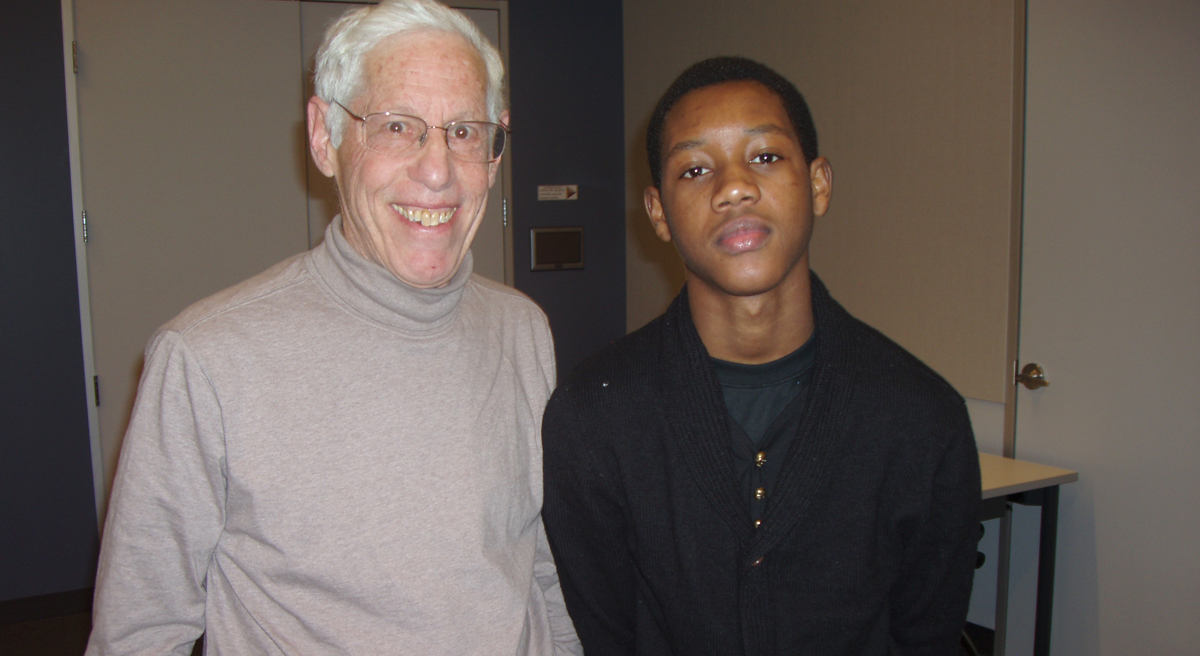Advertisement
The Power Of A Mentor To Change A Young Life

Smaido Romulus didn’t need a study to tell him that having a mentor changed his life.
Five years ago, Romulus, then 14, came to the United States after an earthquake devastated his native country, Haiti. He entered the Massachusetts public school system as a ninth grader and struggled with English as a new language. An immigrant teen, whose father remained in Haiti and whose mother worked long hours and also cares for his younger brother, Romulus struggled to navigate the American school system. He juggled working part-time jobs with his studies. By his freshman year, his grades plummeted, and he was at risk of not graduating from high school.
Seventy-six percent of at-risk youth who had a mentor planned to enroll in college, versus 56 percent of at-risk youth who did not have access to a mentor.
Enter Bob Keller, 77, a retired CFO for Hub Mail Advertising and Earthwatch Inc., who was matched as Romulus’s mentor during his sophomore year. The unlikely pair developed a relationship based on mutual trust, patience and open-mindedness. Over the last five semesters of Romulus’s high school experience, Keller worked to improve his grades, connect him with professionals to shadow, and help him apply to colleges. Keller also exposed Romulus to new social, cultural and community service experiences, which helped him to build his resume and realize his own interests and potential. They plan to explore various financial aid packages and visit college campuses together this spring.
According to The Mentoring Effect, a 2014 report that outlines the effects of informal and formal mentoring on developing youth, 76 percent of at-risk youth who had a mentor planned to enroll in college, versus 56 percent of at-risk youth who did not have access to a mentor. Working with a mentor nearly doubled the number of at-risk youth who participated in a sports team or extracurricular activities, and community volunteerism increased from 27 percent to 48 percent.

In June, Romulus, now 18, will graduate from Waltham Public High School with honors. His English has improved, which has helped him build his social network and self-confidence, and he is taking a full course load while working part-time at a local assisted living facility. He dreams of being accepted to the University of Massachusetts Amherst, where he’d like to pursue a bachelor’s degree in engineering. He aspires to become a civil engineer. Doing so would change his life and that of his immediate and future families.
Romulus’s inspiring story is not that unusual for youth who have had the good fortune to participate in a mentoring program. That’s good news for the 4.5 million American youth currently involved in a mentoring program. But what about the millions more who are not? More mentors to engage with at-risk youth are needed to make meaningful changes and interrupt the poverty cycle.
More mentors to engage with at-risk youth are needed to make meaningful changes and interrupt the poverty cycle.
In "How to Close America’s Mentoring Gap," the National Mentoring Partnership reports findings from a national poll that indicate that as many as 44 million adults would be willing to volunteer as mentors. However, only a fraction of those who expressed interest in mentoring a child initiate the steps to do so. The study also shows there is a greater need for more male and minority mentors.
Those who have found their way to mentoring, like Keller, report learning and growing as much or more from the experience than the youth themselves, a fact that underscores the beauty of mentorship.
January is National Mentor Month, a perfect time for new mentors to join organizations and start creating relationships that will have a lasting impact on the lives of others.
